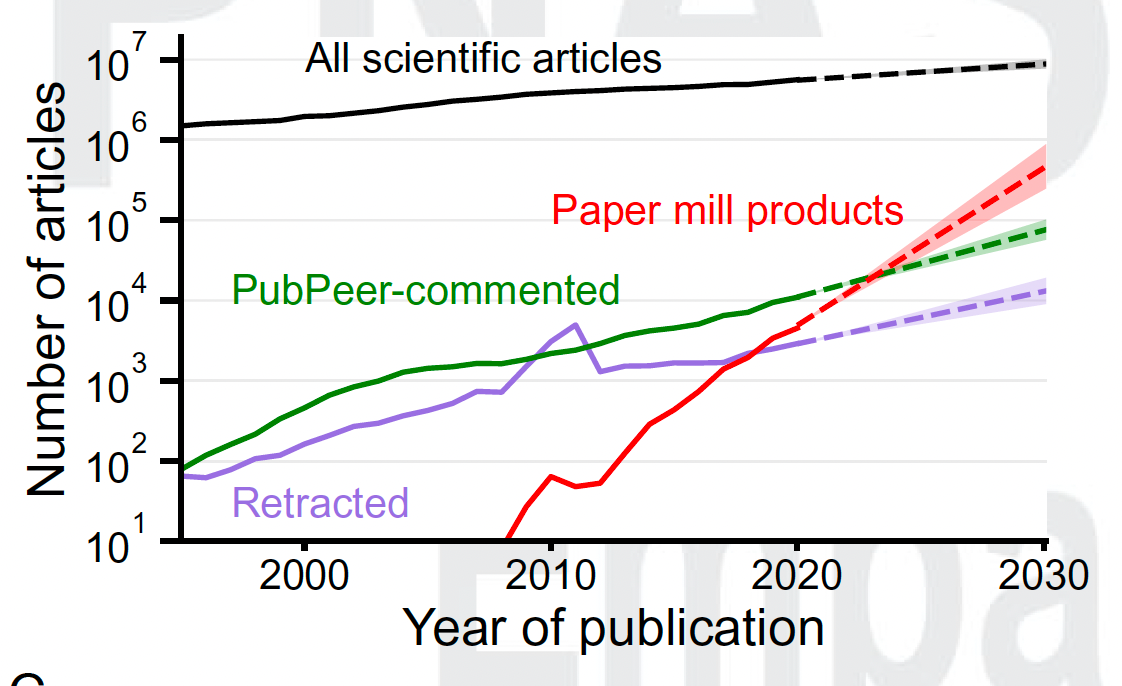An organised underground network of individuals and groups is enabling fraudulent research and increasingly undermining the integrity of science, an alarming new study warns.
Researchers from Northwestern University in the US conducted a large-scale data analysis of scientific literature and found that sophisticated global networks were systematically undermining the integrity of academic publishing.
The study, published in the journal PNAS, says the publication of fraudulent research is outpacing the growth of legitimate scientific works.
Researchers say the findings should be a wake-up call for the scientific community to act before the public loses confidence in the scientific process.
"This study is probably the most depressing project I've been involved with in my entire life," Luís AN Amaral, a complex social systems researcher from Northwestern University and one of the study’s authors, said. "Science must police itself better in order to preserve its integrity.”
Scientific fraud typically involves fraudulent research practices such as falsification of data or plagiarism that may lead to retracted papers.
These practices were generally believed to be isolated actions of individuals taking shortcuts to get ahead in an increasingly competitive field. But the latest study uncovered an underground network operating in the shadows “to fake the process of science”.
"Millions of dollars are involved in these processes,” Dr Amaral said.
In the study, researchers analysed datasets of retracted publications, editorial records and instances of image duplication from major aggregators of scientific literature like Elsevier's Scopus and the National Library of Medicine's PubMed. They also combed through data from scholarly journals removed from databases for failing to meet quality or ethical standards and from articles highlighted by the popular science integrity blog Retraction Watch.
They found a network of "paper mills", brokers and infiltrated journals that churned out large numbers of manuscripts and sold them to academics seeking to quickly publish new work.
The manuscripts were usually of low quality, featuring fabricated data, manipulated or even stolen images, and plagiarised content.
"Not only can they buy papers, but they can buy citations. Then, they can appear like well-reputed scientists when they have barely conducted their own research at all,” Dr Amaral said.
Researchers said they had only now started to scratch the surface of this network.
"Paper mills operate by a variety of different models," Reese Richardson, another author of the study, said. “They often sell authorship slots for hundreds or even thousands of dollars. A person might pay more money for the first author position or less money for a fourth author position.”

Academicians appear to push fraudulent research for publication using a number of strategies. In some cases, groups of researchers collude to publish papers in multiple journals. When their fraudulent activities are discovered, they quickly retract the papers.
Some people pay to have their papers accepted for publication in journals through a “sham peer-review process”.
The latest research also underlines the role of brokers who enable mass publication of fraudulent papers in compromised journals.
"Brokers connect all the different people behind the scenes," Dr Amaral explained. “You need to find someone to write the paper.
“You need to find people willing to pay to be the authors. You need to find a journal where you can get it all published. And you need editors in that journal who will accept that paper.”
These underground organisations sometimes go around established journals and instead look for defunct journals to hijack.
When a legitimate journal stops publishing, some bad actors take over its name or website and surreptitiously assume its identity.
"This happened to the journal HIV Nursing. It was formerly the journal of a professional nursing organisation in the UK, then it stopped publishing, and its online domain lapsed,” Dr Richardson said.
“An organisation bought the domain name and started publishing thousands of papers on subjects completely unrelated to nursing.”
Researchers call for a multipronged approach to combat this network that undermines the integrity of science.
They emphasise the need for enhanced scrutiny of editorial processes, improved methods for detecting fabricated research, and a radical restructuring of the system of incentives in science.
Scientists also call for further research to understand the networks facilitating this misconduct.
"If we're not prepared to deal with the fraud that's already occurring, then we're certainly not prepared to deal with what generative AI can do to scientific literature," Dr Richardson said.
"We have no clue what's going to end up in the literature, what's going to be regarded as scientific fact and what's going to be used to train future AI models, which then will be used to write more papers.”
Post to Coast: New York Post plans a California newspaper
Urgent warning issued to people selling their identities online
A look at colleges with federal money targeted by the Trump administration
Meta and Microsoft add $500bn to value overnight: ‘Investors are screaming with joy’
Discovery in Arctic cave provides a ‘rare snapshot of a vanished world’
How a livestream from the bottom of the ocean became the latest social media hit







